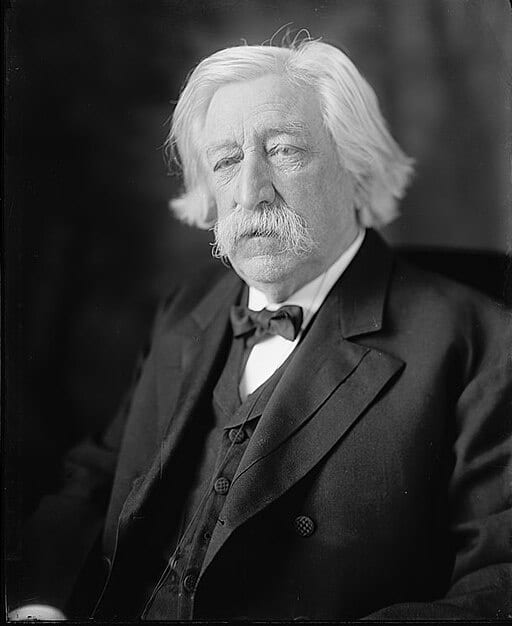Melville Weston Fuller (1833-1910) was the eighth chief justice on the Supreme Court. He was born in Maine, raised in the household of a maternal grandfather who served as Maine’s chief justice, and graduated from Bowdoin College. He briefly attended Harvard Law School, and qualified for the bar by reading law.
Fuller moved to Chicago where he supported the Democrat Party and established his reputation as an attorney.
He was a delegate to the Illinois constitutional convention of 1862. He also served in the Illinois House of Representatives and was elected as president of the state bar association.
When Morrison Waite died in 1888, President Grover Cleveland appointed Fuller, who had argued many cases before it, to the U.S. Supreme Court. He served competently until his death in 1910 over a court that experienced heavy turnover during his tenure.
Melville Fuller Court known for upholding rights of big business
The Fuller Court is better known for its decisions using the idea of substantive due process and liberty of contract to uphold the rights of big business than for its decisions advancing personal liberties. Fuller authored the majority opinion in Pollock v. Farmers’ Loan & Trust Co. (1895), which invalidated the national income tax (a decision later overturned by the 16th Amendment). Fuller also authored the decision in United States v. E.C. Knight Co. (1895), which limited the reach of the Sherman Antitrust Act under the interstate commerce clause. He joined in the decision in Lochner v. New York (1905), which denied the right of states to enact wage and hour legislation.
Fuller concurred in the notorious opinion in Plessy v. Ferguson (1896) that accepted the doctrine of separate but equal when it came to racial accommodations. (Plessy v. Ferguson was overturned by Brown v. Board of Education in 1954). Fuller wrote a dissenting opinion in United States v. Wong Kim Ark (1898), which had on the basis of the 14th Amendment affirmed the U.S. citizenship of an individual born in the United States to Chinese parents.
Although Fuller rejected Cleveland’s offer to appoint him as Secretary of State, he did serve on a commission in 1897 to settle a Venezuelan boundary dispute and on the Permanent Court of Arbitration.
Fuller Court upheld law that confiscated Mormon church property
As chief justice, Fuller served during a period when the Supreme Court, following the decision in Barron v. Baltimore (1833), had not yet applied the provisions of the First Amendment or other provisions of the Bill of Rights to the states. He did, however, participate in a number of cases that implicated First Amendment freedoms.
In a decision consistent with earlier rulings in Reynolds v. United States (1879) and Davis v. Beason (1890), in Late Corporation of the Church of Jesus Christ of Latter-day Saints v. United States (1890), the court upheld the Edmunds-Tucker Act of 1887. The law allowed the government to repeal the charter of the Church of Jesus Christ of Latter-day Saints and to seize its property because it had practiced polygamy.
Although Fuller supported criminal laws against polygamy, he dissented in this case because he did not think that Congress had such confiscatory power. The government returned the property when the church renounced polygamy. Moreover, in Municipality of Ponce v. Roman Catholic Apostolic Church in Porto Rico (1908), Fuller wrote a decision ruling that the Catholic Church, rather than a Puerto Rican municipality, owned a house of worship.
Fuller wrote opinion on restricting use of mail for lottery cards, ads
In the case of In re Rapier (1892), Fuller authored the opinion upholding legislation restricting the use of the mail to send lottery cards or advertisements for the lottery. The restriction had been challenged partly on how it interfered with free press rights under the First Amendment.
Fuller dissented in Hennington v. Georgia (1896) when the court upheld a Georgia law that prohibited trains from operating on Sundays. The court ruled that the law, which was similar to Sunday blue laws, did not interfere with interstate commerce in the absence of conflicting congressional legislation.
Rejecting First Amendment arguments raised by Clarence Darrow, Fuller wrote the majority opinion in United States ex rel. Turner v. Williams (1904). It decided that the national government had the power to deport an alien anarchist under the 1903 Anarchist Exclusion Act. Fuller reasoned that the government was exercising its power of self-preservation by so doing.
Fuller Court upheld citation against newspaper editor who criticized state supreme court
At a time when the court had not yet applied the provisions of the First Amendment to the states, Fuller joined the majority opinion in Patterson v. Colorado (1907) upholding a Colorado contempt citation against a newspaper editor who had criticized a decision by the state supreme court.
In Quick Bear v. Luepp (1908), Fuller authored the unanimous opinion rejecting Native American pleas to cease expenditures to religious schools from treaty trust funds. Fuller believed that the Native Americans had the right to designate such funds in the way that they had specified by treaty.
When Fuller died, President Taft, who coveted the job of chief justiceship for himself, elevated Justice Edward Douglass White to replace him as chief. Taft later succeeded White in that position.
John R. Vile is a professor of political science and dean of the Honors College at Middle Tennessee State University.

